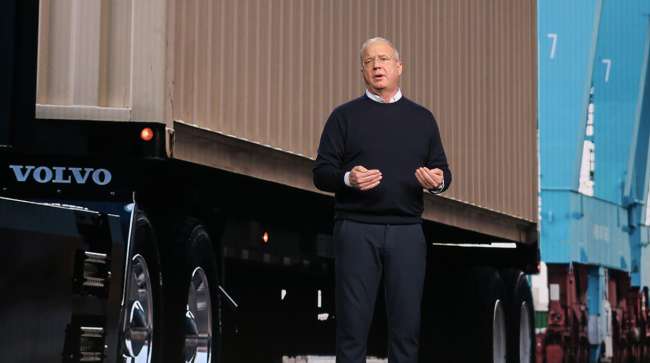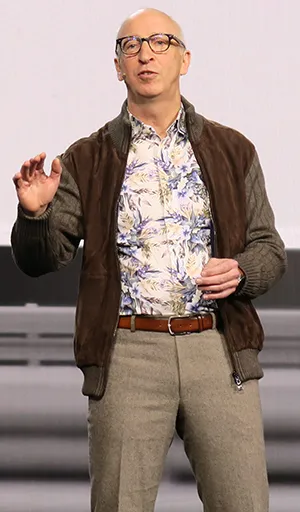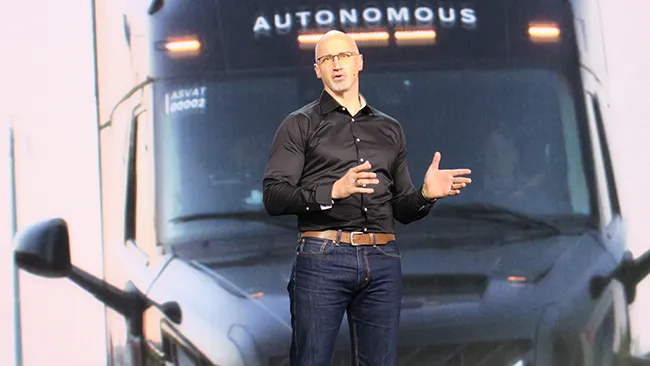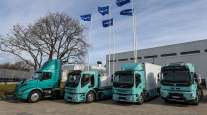Managing Editor, Features and Multimedia
Volvo Charts Course Toward Sustainable Trucking at CES

[Stay on top of transportation news: Get TTNews in your inbox.]
LAS VEGAS — Volvo Group CEO Martin Lundstedt outlined the global truck manufacturer’s vision for a cleaner, safer and more productive transportation industry at CES 2025, the world’s largest tech event.
During a Jan. 8 keynote session, Lundstedt emphasized the indispensable role of transportation in our society while also focusing heavily on Volvo’s efforts to decarbonize the movement of goods through zero- and low-emission vehicle technologies.
“Transport and logistics is what makes modern life possible,” he said. “At Volvo Group, we are using technology to innovate and transform the very foundation of the transportation industry.”
Volvo Group, the parent of Volvo Trucks North America and Mack Trucks, has been deploying battery-electric trucks to a growing list of fleet operators in recent years while also investing in hydrogen fuel cell technology and combustion engines powered by renewable fuels.
Wednesday at #CES2025! 🚛✨ Our President and CEO, Martin Lundstedt, took the stage to share Volvo Group's vision for the future of transport and mobility, and showcasing how innovation drives our industry forward. Honored to have presented at the world's largest tech show! pic.twitter.com/Tc5yePnYqF — Volvo Group NA (@VolvoGroupNA) January 9, 2025
Lundstedt acknowledged, however, that trucking’s transition away from fossil fuels will not be easy and will not happen overnight.
“It is a massive undertaking and a once-in-a-lifetime challenge,” he said.
Lundstedt said the pace of adoption for zero-emission commercial vehicles will likely follow the rhythm of the hype cycle, which now has passed the peak of inflated expectations and has entered the so-called trough of disillusionment.
PHOTO GALLERY: Images from CES 2025
“This is not the end. This is the turning point,” he said. “History shows that this stage is where strategies are refined, resilience is tested and the foundation for success is built.”
Establishing the full ecosystem for fossil-free transportation will require closer partnerships among numerous stakeholders, including big companies and startups, government and the private sector, truck makers, freight transportation companies, shippers and consumers of goods, Lundstedt said.

Volvo Group's chief technology officer, Lars Stenqvist, outlines the company's investments in decarbonization, connectivity and safety. (Seth Clevenger/Transport Topics)
“Partnership is truly the new leadership,” he said.
During his remarks, Lundstedt presented five key variables for the adoption of fossil-free transportation: the availability of products, cost competitiveness, charging infrastructure for heavy vehicles, clean energy to power them and a greener supply network.
While battery-electric trucks have been available for several years from Volvo and other manufacturers, the charging infrastructure to support these vehicles has been slow to develop.
In the United States, it can take one to two years to secure permits for charging stations, three to five years to upgrade distribution and 10 to 20 years to build substations, Lundstedt said. “The time to act was yesterday, as we know, but now we must move faster than ever.”
He also said robust government incentives and policies are needed to bridge the considerable price gap between a diesel and an electric truck.
“Clean transportation tech must be profitable and cost competitive,” Lundstedt said.
Although diesel continues to dominate the trucking industry in North America, the use of electric-powered trucks is gradually expanding.
Volvo has delivered its heavy-duty VNR Electric model to customers in 19 U.S. states and Canadian provinces, said Lars Stenqvist, Volvo Group’s chief technology officer.
“By 2040, we believe most vehicles will be electric, but not just one type of electric solution,” he said. “We are investing heavily in both battery electric and fuel cell electric.”
Truck Parking Club's Evan Shelley discusses how innovative platforms are turning available space into opportunities for reserved parking. Tune in above or by going to RoadSigns.ttnews.com.
Apart from electrification, Volvo is investing in combustion engines running on fossil-free renewable fuels such as green hydrogen.
“To decarbonize our industry, there is no single magic solution, no silver bullet,” Stenqvist said. “It’s about having the right tools for the job to be done. Different sectors in the transportation industry need different solutions.”
The transportation industry is also in the midst of a digital transformation.
Stenqvist outlined Volvo’s use of connectivity and data to improve fuel efficiency and streamline maintenance, while also discussing the broader movement toward software-defined vehicles that can be constantly improved through software updates.
“Our vehicles are getting more and more software defined,” he said. “We are truly at the beginning of a paradigm shift here.”
Last year, Volvo and rival truck manufacturer Daimler Truck agreed to form a joint venture to accelerate the development of a software-defined vehicle platform for commercial trucks.
That platform might even become a standard operating system for the industry, Stenqvist said.
Another area of innovation in commercial trucking is the ongoing development of autonomous driving technology to enhance safety and boost industry efficiency.
Volvo has partnered with autonomous vehicle company Aurora to integrate its virtual driver software and sensors with its trucks.

Aurora's Sterling Anderson says autonomous trucks can improve road safety by recognizing potential hazards sooner than humans. (Seth Clevenger/Transport Topics)
Sterling Anderson, Aurora’s co-founder and chief product officer, provided a look at the technology company’s Aurora Driver system in action during the keynote session.
“Safety is the primary value proposition of autonomy,” he said. “Our driver is designed to be superhuman — to see further, to think faster and to react better than a human driver could.”
To illustrate the potential safety benefits of autonomous trucks, Anderson showed video of an Aurora test truck unexpectedly encountering a pedestrian on the side of the highway in the Texas desert in the middle of the night.
The Aurora Driver detected the pedestrian 11 seconds earlier than a human driver would have, Anderson said, thus giving the autonomous driving system plenty of time to safely move over and give a wider berth.
Andrea Fuder, Volvo Group’s chief purchasing officer, underscored the importance of partnerships across the supply network to achieve industry decarbonization.
Want more news? Listen to today's daily briefing above or go here for more info
Transactional relationships with suppliers are evolving into real partnerships to speed up the transformation of the logistics sector, she said.
“The power of a supply network with a shared purpose to drive positive change is exponential,” Fuder said.
Also taking the stage during the session was Ebba Busch, deputy prime minister of Sweden, the home country of Volvo Group.
In her remarks, Busch highlighted Sweden’s history of innovation, touted the opportunities enabled by new technologies and called on the audience to help instill the values of hard work and curiosity in the next generation, along with a greater sense of hopefulness for the future.





